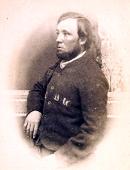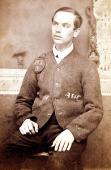

William Craddock and Robert Jordan in the Bedford Gaol Register [QGV10/4]
“His Lordship then summed up the evidence at great length and in his accustomed lucid manner. The prisoners at the bar, Robert Jordan and William Craddock, were charged with one of the gravest offences known to the law, namely wilful murder; but before they could convict the prisoners of the charge they must be satisfied beyond all reasonable doubt that they wee the two persons who inflicted the injuries upon the deceased which caused his death. Should they come to the conclusion that the prisoners committed the offence, then another important question arose, whether they were satisfied that those injuries were inflicted upon Mr. Budd, of which he died, were inflicted under the circumstances to make the prisoners guilty of wilful murder. Because he was bound to tell them that it is not every case of homicide, nor every case of unlawful killing that will amount to a crime of wilful murder. It may be that there are circumstances in the case which left no doubt upon their minds that the prisoners at the bar were guilty of striking the blows that caused death, but under circumstances which, in point of law, render them guilty of manslaughter, but not guilty of murder. It is not very easy to point out precisely when a case of murder ends and a case of manslaughter begins, but it may be taken as a general rule in the present state of the law, that when they found persons armed with deadly weapons made an attack upon others without having received the slightest provocation, and inflicted injuries that caused his death, if they intended to kill the person, that is murder; but if there be such reasonable provocation as would justify the infliction of the wounds, that would not be a case of murder; but if they found that deadly instruments were used on a sudden quarrel, and that the wounds inflicted were not of themselves such as not necessarily to produce death at that time, but that death occurred subsequently, then that would not be a case of murder. After explaining more minutely the distinction between murder and manslaughter, he said that in this case, unless they were satisfied that the parties intended to do some grievous bodily harm, they could not commit for the crime of murder, but they must find for manslaughter. He then read over the evidence, commenting on the several points. He said the case was one of an unusual character, for no two witnesses agreed in their evidence entirely excepting the medical gentlemen. The points on which the evidence agree comprised the assault upon Mr. Budd, the injuries inflicted, and his death arising from those injuries. But the other part of the case was unsatisfactory and conflicting. If the jury thought there was not satisfactory evidence to justify in finding for wilful murder, they would fins for manslaughter”.
“The jury retired, and after deliberating for nearly half an hour they re-entered the box, when the foreman returned a verdict against both prisoners of MANSLUAGHTER, with a recommendation to mercy on account of their previous good characters”.
“His Lordship, in passing sentence, said, after a very careful consideration of their case, the jury had come to the conclusion that they were not guilty pf wilful murder, but guilty of manslaughter. They had come to this conclusion because they considered, and beyond all doubt believed, that when they inflicted the wounds upon the deceased, of which he died, that they did not intend either to cause his death or do grievous bodily harm. They had received a good character, and everyone who has heard this case must deeply regret that persons who have received so good a character, should stand in their position. The jury had recommended them to mercy. He had no reason to doubt, and he certainly hoped that their conduct, except on that unfortunate evening, warranted that good character. There was no doubt that the jury had formed a correct opinion of the case, and that they are of the opinion that the prisoners did not intend to kill nor inflict grievous bodily harm, although it has been proved satisfactorily that death resulted from the blows inflicted upon the unfortunate deceased. He was bound to tell them that this was a very heinous case. The unfortunate gentleman was walking home peaceably with his wife, when, without any reasonable ground of provocation, the prisoners set upon him with violence and knocked him down; and not satisfied with having committed the first outrage, they pursued and repeated their violence, hit him again and again, knocked him down, and whilst in that state beat him until he became insensible, This was a case of a grave character – in fact. One of the gravest; and though there were some mitigating circumstances which induced him to pass a more lenient sentence than, in the discharge of his duty, he otherwise should have passed, still it left him no option in the interest of justice than to pass a severe sentence, which was that each of them be kept in penal servitude for seven years”.
“The leniency of the sentence appeared to cause considerable surprise”.
“This concluded the business of the assize”.